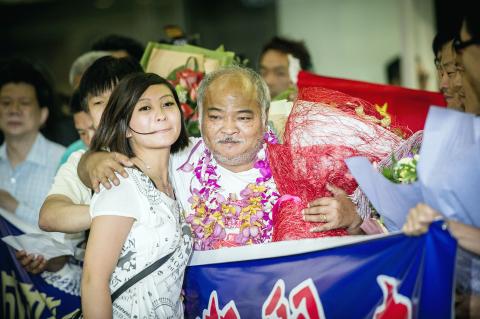In a statement contrary to its repeated stance that Taiwan does not team up with China in defense of sovereignty over the contested Diaoyutai Islands (釣魚台), government officials yesterday recognized the recent display of the Republic of China (ROC) national flag by pro-China activists on the islands.
“We thought that the appearance of the ROC national flag on the islands was in accordance with our sovereignty claims over the Diaoyutai Islands,” Deputy Minister of Foreign Affairs Tung Kuo-yu (董國猷) said.
Tung said he also conveyed that view to Japanese representative to Taiwan Sumio Tarui when he called him in on Thursday to express the government’s concerns over Tokyo’s increasing assertiveness over the Diaoyutai Islands.

Photo: AFP
Japan yesterday deported 14 pro-China activists from Hong Kong, Macau and China, who were arrested by Japanese maritime security officers after they landed on the Diaoyutais, known as the Senkaku Islands in Japan, on Wednesday.
The activists carried with them the ROC national flag, the People’s Republic of China (PRC) national flag, the flag of the Chinese Nationalist Party (KMT) and flags representing the Government of the Hong Kong Special Administrative Region and the Government of Macau Special Administrative Region.
Taiwanese activists did not participate in the action, blaming the government for stopping fishermen from renting them boats.
Under instructions handed down by President Ma Ying-jeou (馬英九) via meetings called by National Security Council Secretary-General Hu Wei-jen (胡為真), the government provided food supplies to the pro-China activists on the Bao Diao II “for humanitarian reasons” en route to the Diaoyutais.
Immediately after the pro-China activists were arrested, the Ma administration called for their release “for the sake of maintaining stability of the region.”
In contrast to its statements targeting Japan for being “oblivious” to the contention over the sovereignty of the islands, the Ma administration yesterday appeared to further sympathize with the pro-China activists.
As well as Tung’s comments, Premier Sean Chen (陳冲) said, in response to media queries, that the government looked at any act staged “purely” to assert Taiwan’s sovereignty over the Diaoyutais “from a positive perspective” as long as the act “was not tinged with other motives.”
Chen added that the best strategy was to advocate the East China Sea peace initiative proposed by Ma on Aug. 5, in which he called for all concerned parties to refrain from antagonistic actions, to shelve disputes on sovereignty and to cooperate on exploring resources.
The ministry said the initiative has received a positive response from Tokyo.
“We came to a consensus to reduce tension in the region. Sumio Tarui also said that President Ma’s initiative was well-received in Japan,” Tung said.
Tung said he told Tarui that the government “knew nothing in advance” about the action taken by the pro-China activists “on their own initiative” and that it had not been involved.
He also told Tarui that the government maintains the position that Taiwan does not cooperate with China in its handling of its claim to the islands.

MAKING WAVES: China’s maritime militia could become a nontraditional threat in war, clogging up shipping lanes to prevent US or Japanese intervention, a report said About 1,900 Chinese ships flying flags of convenience and fishing vessels that participated in China’s military exercises around Taiwan last month and in January last year have been listed for monitoring, Coast Guard Administration (CGA) Deputy Director-General Hsieh Ching-chin (謝慶欽) said yesterday. Following amendments to the Commercial Port Act (商港法) and the Law of Ships (船舶法) last month, the CGA can designate possible berthing areas or deny ports of call for vessels suspected of loitering around areas where undersea cables can be accessed, Oceans Affairs Council Minister Kuan Bi-ling (管碧玲) said. The list of suspected ships, originally 300, had risen to about

DAREDEVIL: Honnold said it had always been a dream of his to climb Taipei 101, while a Netflix producer said the skyscraper was ‘a real icon of this country’ US climber Alex Honnold yesterday took on Taiwan’s tallest building, becoming the first person to scale Taipei 101 without a rope, harness or safety net. Hundreds of spectators gathered at the base of the 101-story skyscraper to watch Honnold, 40, embark on his daredevil feat, which was also broadcast live on Netflix. Dressed in a red T-shirt and yellow custom-made climbing shoes, Honnold swiftly moved up the southeast face of the glass and steel building. At one point, he stepped onto a platform midway up to wave down at fans and onlookers who were taking photos. People watching from inside

Japan’s strategic alliance with the US would collapse if Tokyo were to turn away from a conflict in Taiwan, Japanese Prime Minister Sanae Takaichi said yesterday, but distanced herself from previous comments that suggested a possible military response in such an event. Takaichi expressed her latest views on a nationally broadcast TV program late on Monday, where an opposition party leader criticized her for igniting tensions with China with the earlier remarks. Ties between Japan and China have sunk to the worst level in years after Takaichi said in November that a hypothetical Chinese attack on Taiwan could bring about a Japanese

STREAMLINED: The dedicated funding would allow the US to transfer equipment to Taiwan when needed and order upgraded replacements for stockpiles, a source said The US House of Representatives on Thursday passed a defense appropriations bill totaling US$838.7 billion, of which US$1 billion is to be allocated to reinforcing security cooperation with Taiwan and US$150 million to replace defense articles provided to the nation. These are part of the Consolidated Appropriation Act, which the US House yesterday passed with 341 votes in favor and 88 against. The act must be passed by the US Senate before Friday next week to avoid another government shutdown. The US House Committee on Appropriations on Monday unveiled the act, saying that it allocates US$1 billion for the Taiwan Security Cooperation Initiative